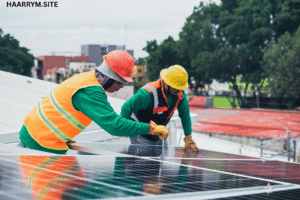Traveling in a motorhome gives the opportunity to roam free from the need to be attached to hook-ups or campgrounds. When you’re miles from the closest socket, however, what drives your appliances, refrigerator, lights, and other basics? For off-grid activities, motorhome solar panel systems provide a quick, environmentally friendly, and more popular answer.
We will take you through everything you need know about selecting, installing, and running a solar panel system for your RV in this tutorial. Whether you are a weekend warrior or a full-time RVer, solar power may help you save money, lower your environmental impact, and provide you the flexibility to go wherever the road leads you.
Why Would You Want a Motorhome Solar Panel Kit?
Knowing why solar energy is perfect for RV living can help one appreciate product choices and installation advice.
1. Independence Regarding Energy
By means of a solar panel kit, you may provide your own power independent of loud generators or campsite hook-ups. For isolated boondocking—that is, dry camping—this is ideal.
2. Economically Conscious
Although the initial outlay for a solar panel set might appear excessive, over time the pay-off is clear. You’ll save maintenance expenses, save on generator fuel and camping fees.
3. Green Energy Source
By using pure, renewable energy from the sun, solar panels help to lower your carbon footprint and dependency on fossil fuels.
4. Subdued and Low Maintenance
Solar panels need little maintenance and operate quietly unlike generators. With little to no upkeep once placed, they may survive for 20+ years.
Included in a Motorhome Solar Panel Kit Are What?
Usually for motorhouses, a solar panel package consists of:
-
Solar Panels: Gather sunlight and translate it into power.
-
Charge Controller: Regulates the voltage and current entering your battery, therefore avoiding overcharging.
-
Inverter (Optional): To operate domestic appliances, an optional inverter turns DC power—from your battery—into AC electricity.
-
Wiring and Mounting Hardware: Every required connection, bracket, screw.
-
Battery (Optional): Though many kits are offered separately, some contain deep-cycle batteries—optional.
How Should One Select the Best Motorhome Solar Panel Kit?
Purchasing a motorhome solar system requires consideration of several elements. Here’s some things to give thought:
1. Your Fuel Requirements
First figure out your daily energy use. List the appliances you run together with their wattage. As a matter of fact:
-
20W LED lights run four hours a day
-
60W, 24/7 fridge
-
Laptop (100W, two hours daily)
-
Ten W phone charging for three hours daily
The size of the solar panel system you need will depend on your expected consumption; typically RVers use between 200W and 600W systems.
2. Type of Solar Panel Used
Panels come in three varieties:
-
Monocrystalline: Perfect for limited roof area, most efficient and space-saving.
-
Polycrystalline: Slightly less efficient but more reasonably priced.
-
Flexible Panels: Lightweight and fit curved surfaces, though usually less durable.
3. Mobile Nature
While some solar systems are installed permanently on your roof, others are movable and fit for ground level. Decide depending on your camping style and power use.
4. Complexity of Installation
Are you intending to call a professional or do you like doing projects? Some kits need for technical expertise while others are plug-and-play. Select a kit fit for your comfort degree during installation.
Top Suggested Motorhome Solar Panel Kits for 2025
These are some of the most dependable and highly rated kits available this year:
1. Renogy 400W Solar Kit
Features: Four x 100W monocrystalline panels, 40A MPPT charge controller, mounting brackets
Advantages: Great efficiency, extendable, reputable brand
Ideal for: Full-time RVers
2. Go Power 190W Overlander Kit
Features: 30A controller, cable kit, 190W panel
Benefits: Simple to install, perfect for medium energy consumers
Ideal for: Part-time tourists
3. Jackery Solar Generator 1000
Features: Two x 100W portable panels and a 1002Wh power station
Advantages: Totally portable and plug-and-play
Perfect for: Beginners, infrequent campers
4. EcoFlow Delta 2 + 220W Solar Panel
Unique Feature: Portable solar with battery pack
Pros: High power output, quick charging, portable nature
Greatest for: Contemporary digital nomads
Installation Advice for RV Solar Panels
Although installing a solar panel system on your RV seems difficult, with some preparation it is doable. Here is a broad summary:
1. Plan the Location of the Panels
Look for a place with greatest solar exposure—usually the roof. To prevent shadow, make sure panels avoid vents and air conditioning systems.
2. Panel Mounting
Apply mounting hardware and braces. Drill precisely and apply sealant to stop roof leaks.
3. Wiring and Connections
Connect the cabling to the charge controller then to your battery bank by running it over the roof and into the RV.
4. Connect the Inverter (Should it Be Necessary)
Connect the inverter to the battery to translate DC to AC electricity if you use AC equipment.
Always do as advised by the manufacturer and safety rules. In doubt, see a qualified installation.
Conserving Your Solar Panel Kit
To maintain your solar system running as best it:
-
Clean Panels: Dust and trash lower the efficiency
-
Inspect Hardware: Make sure screws and cables stay tight
-
Monitor Output: Track performance using either a smartphone app or a solar charge controller with display
-
Battery Maintenance: Maintain correct charging cycles and look for corrosion or damage
Typical Concerns About Motorhome Solar Systems
Q: For what size RV do I need solar?
A: Your energy use will determine this. For minimum requirements, 200W might be enough. Often needed for full-time off-grid life is 400W–600W+.
Q: On solar, can I operate an air conditioner?
A: Most RV air conditioners need for a lot of electricity. You would want a substantial battery bank, a sizable solar array (1000W+) and a strong inverter.
Q: Is a generator less than solar?
A: Solar calls for less maintenance, is cleaner, and quieter. While solar is ideal for regular, long-term usage, generators are handy as backups or during big storms.

Q: RV solar panels last how long?
A: Good solar panels endure twenty to twenty-five years. Batteries and charge controllers could require replacement earlier on.
Final Thoughts
Anyone wishing to comfortably and confidently go off-grid will find a motorhome solar panel kit very essential. It lets you see the globe at your own speed and offers independence, savings, and sustainability.
The correct solar arrangement will keep your lights on, your electronics charged, and your spirit of adventure alive regardless of your level of experience as RVer or newcomer. Spend some time evaluating your demands, selecting appropriate parts, and you will be running years to come.
